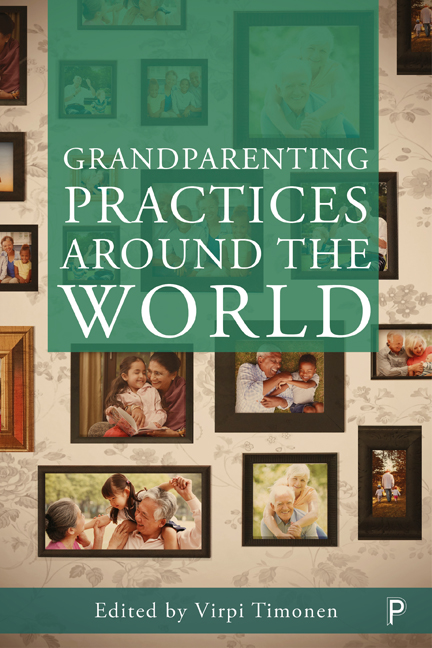Book contents
- Frontmatter
- Contents
- List of figures and tables
- List of abbreviations
- Notes on contributors
- one Introduction: widening the lens on grandparenting
- PART 1 The demographic and welfare-state contexts of grandparenting
- PART 2 Grandparenting in contexts of economic and societal development
- PART 3 Transnational grandparenting
- PART 4 Gender, intersectionalities and grandparenting
- PART 5 Grandparental roles, agency and influence
- Index
fourteen - Conclusions: the grandparents’ century?
Published online by Cambridge University Press: 22 April 2022
- Frontmatter
- Contents
- List of figures and tables
- List of abbreviations
- Notes on contributors
- one Introduction: widening the lens on grandparenting
- PART 1 The demographic and welfare-state contexts of grandparenting
- PART 2 Grandparenting in contexts of economic and societal development
- PART 3 Transnational grandparenting
- PART 4 Gender, intersectionalities and grandparenting
- PART 5 Grandparental roles, agency and influence
- Index
Summary
The chapters in this book have examined the cultural and welfare state contexts of grandparenting. The focus on gender, welfare states, economic development and grandparental agency binds together the diverse contributions to the volume. It is now time to take stock of the contents by sketching out the main lines of argumentation and contributions to the literature contained in the chapters. In other words, this is an opportunity to formulate some key take-home messages and to indicate promising avenues for future research. A notion I will reflect on throughout this chapter is the idea that the 21st century could perhaps be called the ‘grandparents’ century’. This is a reference to the prediction that by the middle of this century, for the first time in human history, there will be relatively more ‘old’ people (60 and over) than children (aged 15 and under) in the global population. As the majority of older adults are grandparents, the global population in the 21st century is indeed characterised by the presence of unprecedented numbers of grandparents. The deeper meanings of this demographic transformation, however, remain to be teased out and cannot be taken for granted.
In Chapter Two, Margolis and Arpino presented a broad overview of the demographic changes not only driving the generally increasing prevalence and importance of grandparenthood but also leading, in some parts of the world, to increases in the age when people typically become grandparents. They demonstrate striking differences in the proportion of older adults who are grandparents, varying (among countries included in their analysis) from just under half in Switzerland to nearly nine in ten in the United States. Rising numbers of childless adults translate into a growing share of the older population who do not become grandparents. In some parts of the world, the growing share of older adults who will not become grandparents translates, at the micro level, into inability to enter a role that many older adults find gratifying and socially important, and that might be beneficial for their health and wellbeing. Postponement of parenthood in the cohorts currently of ‘reproductive age’ translates into later entry into the grandparent role among their parents.
- Type
- Chapter
- Information
- Grandparenting Practices around the World , pp. 271 - 284Publisher: Bristol University PressPrint publication year: 2018



